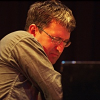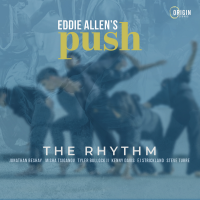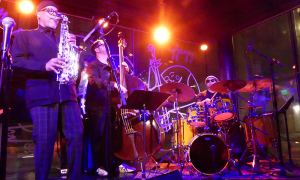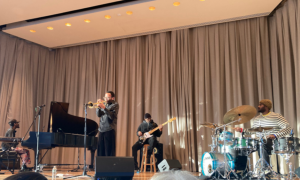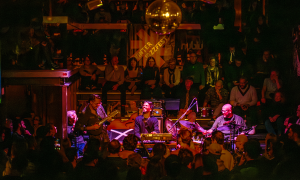Home » Jazz Articles » Live Review » Theo Croker Quintet at House of Blues & Jazz in Shanghai
Theo Croker Quintet at House of Blues & Jazz in Shanghai
House of Blues & Jazz
Shanghai, China
October 26, 2009

On Monday nights House of Blues & Jazz offers a rarity on the Shanghai jazz scene: original music. Tunes written by the players on stage are a special treat when you've been around town listening to covers of standards for the past couple of months. No better place than the o.g. House, where the sound will most likely be supreme due to the venue's vaulted ceilings and general stage/speaker placement. The main room of the House is fairly full on this Monday: an intellectual in the corner, scarf and all, trying to read a thick tome in the low lamplight, and a fair collection of businessmen looking to take the edge off before returning to houses in the suburb or hotel rooms in the immediate area.
 The house music fades and Theo Croker announces the start of the set, mentioning that tonight will be "House of Jazz," even though, according to the dredlocked trumpeter, blues and jazz are the same thing. Feel free to argue with him about it at the next break, he says. The first song is "Clearisms," a tune by Jonathan Parker, one of the more prominent alto saxophonists in town these days. If you were at the Dee Dee Bridgewater concert in Shanghai on October 16th, you may remember Dee Dee bantering with the tall, lanky sax soloist with his fluffy head of hair. Smart for the players to choose a bold start for the evening, where the nuances aren't as important as the band jelling and tuning in to each other.
The house music fades and Theo Croker announces the start of the set, mentioning that tonight will be "House of Jazz," even though, according to the dredlocked trumpeter, blues and jazz are the same thing. Feel free to argue with him about it at the next break, he says. The first song is "Clearisms," a tune by Jonathan Parker, one of the more prominent alto saxophonists in town these days. If you were at the Dee Dee Bridgewater concert in Shanghai on October 16th, you may remember Dee Dee bantering with the tall, lanky sax soloist with his fluffy head of hair. Smart for the players to choose a bold start for the evening, where the nuances aren't as important as the band jelling and tuning in to each other.
The next song is much more lyrical, with the trumpet leading the first verse along with the piano, manned by Sean Higgins. There's a fuzziness to the first two songs that's typical at the start of extemporaneous jazz sessions. Five players finding their way around one another. Curtis Ostle's bass solo steadies the rhythm, and by the time Parker steps up to solo, it seems that the band is on its way. Dizzy Gillespie's famous "Salt Peanuts" is sneaking into the mix here. There are definitely recognizable melodies although the expectation was that they would be playing originals tonight. Ah, Theo explains, that was a cover after all, "Bye Bye Blackbird."
A Croker original is next, "What If." Like Miles Davis' "So What?" there's a distinctive bass line in the background that keeps the solos interesting when you listen beyond the soloist. It's pretty critical that the rest of the band work hard regardless of who's soloing upfront. Higgins on the piano keeps a soft underlining vibe, flying with a harder edge towards the end of his solo—enough to make this listener long for more edge overall in the piece. Another Theo composition follows, "Focus." Again Ostle kicks off with a distinct bass line and the horns jump in. It's soon apparent Parker and Croker have been playing together for a while as the sounds from the horns of each meld together readily. The song, moreover, proves memorable—a catchy main theme that has a lot of brass oomph. Much more kick than the last song. The slide allows the brass to shine more, in the solos as well as the choruses. Charlie brings whimsy to the drums with some alert, catchy but sly rim-smacking. (Hey, let's not forget what jazz is originally about now...sex, sex, sex.) Ha! There's an edge to this song that makes you sit up and pay attention—or focus, if you will.
 The rhythm section is getting really tight as Higgins solos, followed by a fast and fat bass solo to keep the momentum going. Charles Foldesh comes in with a crazy drum roll, and he's almost off his chair, as are the rest of us. Okay, not literally, but at least in my mind I'm on the ceiling at this point. That was one kicking tune. Next, the band's on break, which is as good a time as any for a quick background. Croker, Ostle, Foldesh, and Parker are all classmates from Oberlin Conservatory in Ohio, and Sean Higgins is from Andover, Massachusetts. The Oberlin folk play together quite often, but Sean's been a regular at another venue in town, Brown Sugar, for the past year, so it's been a while since he's jammed with the rest of them. It's rewarding to hear him play jazz though, as I've most often heard him during Brown Sugar's R&B set.
The rhythm section is getting really tight as Higgins solos, followed by a fast and fat bass solo to keep the momentum going. Charles Foldesh comes in with a crazy drum roll, and he's almost off his chair, as are the rest of us. Okay, not literally, but at least in my mind I'm on the ceiling at this point. That was one kicking tune. Next, the band's on break, which is as good a time as any for a quick background. Croker, Ostle, Foldesh, and Parker are all classmates from Oberlin Conservatory in Ohio, and Sean Higgins is from Andover, Massachusetts. The Oberlin folk play together quite often, but Sean's been a regular at another venue in town, Brown Sugar, for the past year, so it's been a while since he's jammed with the rest of them. It's rewarding to hear him play jazz though, as I've most often heard him during Brown Sugar's R&B set.
Theo Croker introduces the second set and promises that everything will be in three's. Damned if I know what that means. He explains, "You know, like the waltz?" and I'm thinking, ah right, boom chak chak, boom chak chak—all right I got it. (Not really, but I'm trying.) The first song is Lawrence Williams' "Number Three." Ostle throws down a lyrical bass solo. Besides the solo, there's a definite dedication to three's coming out his instrument during the accompaniment: bom boom boom, bom boom boom. (Still trying. I am—really.)
Attending more and more jazz gigs has led me to lose myself for a minute or two in one musician or another, and not necessarily the soloist. It's always interesting to see what the drummer, for example, is doing during the horn solo, watching him fly around on the drums as he meanwhile gazes intently at the soloist for the slightest visual signal. And Croker's solo, true to form, is full of surprises. For a second his fingers are flying on an extended trill, and the next he's gliding into a note that lingers just long enough to get under the listener's skin.
 Charles Foldesh next steadily backs up the alto solo, but there's a lot more going on than just a rudimentary rhythm. Foldesh is a strong and sensitive backer, providing enough changes to keep it interesting, enough attention to the rest of his crew to adapt to and match their moods and intensity. Jazz is all about the changes—not simply chord changes, but the sound of surprise: changes at the right moment that keep the music alive without the obvious vocal element that, in other musical idioms, is usually the easiest connection to an audience. Get a vocalist up there, and a different vibe ensues. Ears latch onto the human tremors, the lyrics, the shadow of the singer. But with a solely instrumental performance, the audience has the chance to tune into what's happening beyond the human voice. A good way to tell if the musicians are good is to listen for something interesting, not necessarily from the soloist but a contribution played with life and verve no matter by whom and regardless of where it is in the song. If there's some guy just lagging in the background, forget about it. If a single musician lets up, that missing energy is enough to cause the entire band to lag.
Charles Foldesh next steadily backs up the alto solo, but there's a lot more going on than just a rudimentary rhythm. Foldesh is a strong and sensitive backer, providing enough changes to keep it interesting, enough attention to the rest of his crew to adapt to and match their moods and intensity. Jazz is all about the changes—not simply chord changes, but the sound of surprise: changes at the right moment that keep the music alive without the obvious vocal element that, in other musical idioms, is usually the easiest connection to an audience. Get a vocalist up there, and a different vibe ensues. Ears latch onto the human tremors, the lyrics, the shadow of the singer. But with a solely instrumental performance, the audience has the chance to tune into what's happening beyond the human voice. A good way to tell if the musicians are good is to listen for something interesting, not necessarily from the soloist but a contribution played with life and verve no matter by whom and regardless of where it is in the song. If there's some guy just lagging in the background, forget about it. If a single musician lets up, that missing energy is enough to cause the entire band to lag.
Jonathan Parker's song for his grandmother is up next, "Lois." There's something about grandmothers that always evokes sentiment. The altoist mines this vein by delivering an emotional solo (but is it emotional, or are we as listeners biased by the whole grandmother thing?) He has an intense energy that distinguishes his solos—the kind of musician you have to see only once (for me, it was his appearance with the JZ All Star Big Band), and you immediately say to yourself, holy shit that guy can fly! He's currently in the process of recording his own album, which should be a winner. Meanwhile, back to the present action, Foldesh is tapping the edges of his cymbals with the shoulder of his drumsticks as he accompanies the bass solo—a new technique to this observer. Especially effective is the way Ostle and Higgins come together to wrap up the rhythm section's statement with a simple shared bass line before the horns take it to the finish.
Frank Foster's "Simone" follows, another waltz in three. Foldesh introduces the song with a gentler, rolling tone, using timpani drumsticks with those fuzzy cotton ball ends. The rhythm section is jelling even more in this song. Second sets are likely to be better than the first as the players find their groove—though "Focus" leaves the lasting impression on this night. According to the drummer, Croker wrote "Focus" his sophomore year at Oberlin. A punchy trumpet interlude brings in the next song, "Change," again by the trumpeter-leader. A lot of spirit in this one and a main theme almost as catchy as that of "Focus." The drummer rips into his solo like he's got nothing to lose. He certainly doesn't drag.
 The third set kicks off with Parker's "East Lorraine." But it's midnight, and by this time the reviewer is old, admittedly less attentive to the music. Croker introduces the next song as "a mantra to John Coltrane." It begins with a bass solo, anchoring the rest of the band to a slightly mysterious vibe. Suddenly the rhythm section's got enough rumble and fire to keep tired, old-going-on-broke, going. The talented altoist even picks up the mic and sings on this one, though not all of his words come through. He lets me know later on that it's a verse about Coltrane's life and is usually sung by the entire band: "John Coltrane, Black Spirit; John Coltrane, first new born." The song was written by bassist Bill Lee, Spike Lee's father, who also performed it on a classic Clifford Jordan recording date (Glass Bead Games, 1974). Ostle's bass solo is clean and forceful, with enough control to keep it lyrical as he brings the song and the evening to a close.
The third set kicks off with Parker's "East Lorraine." But it's midnight, and by this time the reviewer is old, admittedly less attentive to the music. Croker introduces the next song as "a mantra to John Coltrane." It begins with a bass solo, anchoring the rest of the band to a slightly mysterious vibe. Suddenly the rhythm section's got enough rumble and fire to keep tired, old-going-on-broke, going. The talented altoist even picks up the mic and sings on this one, though not all of his words come through. He lets me know later on that it's a verse about Coltrane's life and is usually sung by the entire band: "John Coltrane, Black Spirit; John Coltrane, first new born." The song was written by bassist Bill Lee, Spike Lee's father, who also performed it on a classic Clifford Jordan recording date (Glass Bead Games, 1974). Ostle's bass solo is clean and forceful, with enough control to keep it lyrical as he brings the song and the evening to a close.
A good night overall. These musicians are young and hungry and pushing themselves. It's ideal to see the progression from set to set, but if you're looking for a smaller window to drop in for some original jazz tunes, 10:30 P.M. and on, every Monday, is a good bet for catching the second and third sets.
Photo Credits
Jenn Chan Lyman
(Contact the author for more on Shanghai's jazz scene.)
Tags
PREVIOUS / NEXT
Theo Croker Concerts
Support All About Jazz
 All About Jazz has been a pillar of jazz since 1995, championing it as an art form and, more importantly, supporting the musicians who make it. Our enduring commitment has made "AAJ" one of the most culturally important websites of its kind, read by hundreds of thousands of fans, musicians and industry figures every month.
All About Jazz has been a pillar of jazz since 1995, championing it as an art form and, more importantly, supporting the musicians who make it. Our enduring commitment has made "AAJ" one of the most culturally important websites of its kind, read by hundreds of thousands of fans, musicians and industry figures every month.



